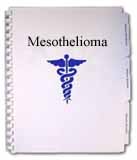|
Mesothelioma and Lung Cancer News - Return to Menu
Local CPA oversees asbestos trust fund
By Len Boselovic, Pittsburgh Post-Gazette
Certified public accountant Mark M. Gleason spends much of his time helping clients, either buyers or sellers, value an asset to determine a fair price. But the Pittsburgh accountant also is gaining a national reputation for knowing how to make assets last.
Mark M. Gleason -- "Well over one million claims could be submitted ... anywhere from today to 30 or 40 years from now."
March 27, 2005 - Gleason, 54, is one of three court-appointed trustees overseeing a $2.5 billion fund established to pay asbestos victims who can link their problems to exposure to products made by subsidiaries of Halliburton, the Houston, energy, engineering and construction services company once chaired by Vice President Dick Cheney.
"Well over one million claims could be submitted ... anywhere from today to 30 or 40 years from now," Gleason says.
The Mt. Lebanon resident left the accounting giant Price Waterhouse in 1988 to start his own firm, Gleason & Associates, based at One Gateway Center, Downtown. In addition to valuing assets, the firm is a restructuring consultant and performs forensic accounting that unravels complex financial transactions. Gleason also acts as an expert witness for cases involving damage claims, intellectual property and other matters.
Acting as a trustee of asbestos trust funds, Gleason says, "is one of the more interesting and significant opportunities that has come out of that practice."
Health problems related to asbestos may not manifest themselves for decades after exposure, which is why money in the Halliburton trust will be expected to last until about 2050. U.S. Bankruptcy Court Judge Judith Fitzgerald in Pittsburgh gave that job to Gleason and two other trustees, former federal appeals court judge Robert M. Parker of Texas and Alan Kahn, a Bozeman, Mont., C.P.A.
Gleason already had experience as a trustee. He has been the sole trustee for an asbestos trust established in 1998 for claims against H.K. Porter. The former Pittsburgh-based conglomerate's businesses included Southern Textile, whose products eventually exposed Porter to costly asbestos litigation. Through the end of last year, the Porter trust had paid $74.9 million in claims to nearly 346,000 victims since it was established in July 1998. It currently has assets of about $80 million, Gleason says.
The Halliburton trust -- known as the DII Industries, LLC Asbestos PI Trust -- was established as part of the prepackaged bankruptcy plan Halliburton filed in December 2003 for Dresser Industries and other subsidiaries. The plan was filed in Fitzgerald's court in Pittsburgh because Harbison-Walker Refractories, a former Dresser subsidiary, was based here. Harbison-Walker made bricks and other linings for industrial furnaces and was responsible for most of the asbestos claims.
Harbison-Walker faced thousands of asbestos claims from all over the United States, either from workers exposed at the company's plants in Pittsburgh and other parts of the country, or from workers employed at factories where the company's products were used.
Asbestos trusts are governed by 1994 amendments to the federal bankruptcy code. They allow companies facing crippling asbestos claims to survive bankruptcy while paying those who develop health problems because of exposure to asbestos. Those problems include mesothelioma, lung and other cancers and asbestosis. The amendments prescribe how troubled companies can channel asbestos claims into a trust and set rules for funding the trust and paying victims.
In the case of the Halliburton subsidiaries, the company paid $2.8 billion to cover asbestos claims filed before the 2003 bankruptcy. To pay subsequent claims, Halliburton contributed 59.5 million of its shares to the trust on Jan. 20. Originally, the shares were going to be sold gradually. However, because of the trustees' fiduciary responsibilities, they sought -- and Halliburton granted -- permission to sell all.
"To be a prudent fiduciary, you've got to diversify these funds," Gleason says. "That was our highest priority."
The fact that Halliburton shares have surged in recent months on speculation high oil prices will fatten the company's bottom line also made it "an opportune time to liquidate and limit our downside in the future," Gleason says.
"When we began this process, the stock was at $22. We sold it at $42.50," Gleason says.
The 59.5 million shares were sold March 17 in one of the largest-ever secondary stock offerings. Proceeds of $2.5 billion were transferred by wire to the trust last week. They were placed into short-term investments until Gleason, Parker and Kahn hire investment managers to oversee the funds.
Halliburton's bankruptcy plan for its subsidiaries sets rules for paying claimants based on their medical problems. Those rules are being translated into a claim form that Gleason expects to be ready by the end of summer. Once that happens, the trust can begin the lengthy process of evaluating and paying claims, as well as making sure the $2.5 billion lasts.
The trust is managed by Trust Services Inc., a Greenville, Texas, firm that specializes in managing asbestos trusts. The firm will soon have a web page with information on the claims process and for filing a claim over the Internet, Gleason says.
In the meantime, those who believe they may be eligible to file a claim should contact their attorney or call the trust at 1-903-450-0386.
-----------------------------------------------------------
(Len Boselovic can be reached at lboselovic@post-gazette.com or 412-263-1941.) |

































